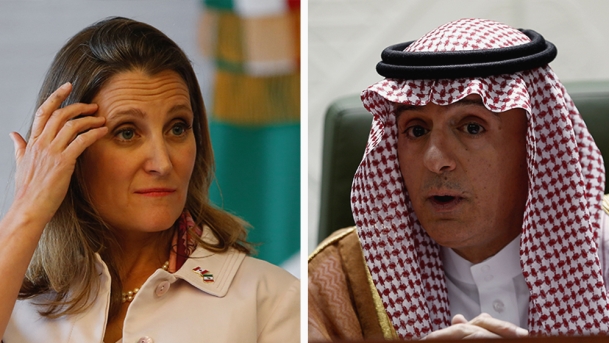
The diplomatic crisis, which broke between Saudi Arabia and Canada over a tweet published by the Canadian Embassy in Riyadh criticising the arrests of two Saudi women’s rights activists, raised many questions regarding the meaning of interference in internal affairs, but also the Saudi reaction to the similar cases of criticism in the realm of human rights.
The Canadian Embassy expressed its concern “about additional arrests of civil society and women’s rights activists in Saudi Arabia, including Samar Badawi,” which Saudi Arabia saw as “a grave and unacceptable transgression against the Kingdom’s regulations and procedures, and in violation of the judicial authority in the Kingdom.” Within hours, Riyadh expelled the Canadian ambassador, recalled its own ambassador to Canada, froze the trade with Ottawa and questioned the future of over 12,000 Saudi students at Canadian universities.
However, the arbitrary selectiveness of Saudi Arabia in the reactions towards the criticism, raised questions about the criteria used by the Kingdom in dealing with the concept of interference. A recent US annual report on human rights released in April 2018 was an even more severe criticism to Saudi Arabia over a long list of violations, including “extrajudicial killings, executions, arbitrary torture and detention, unlawful interference with personal life and restriction of freedom, practicing human trafficking and violence against women and sexual discrimination.” This statement, but also the one from the Human Rights Watch, which openly called out Saudi Arabia and Crown Prince Salman for “their arbitrary arrests, trials, and convictions of peaceful dissidents” was not addressed by Saudi Arabia at any level, prompting many to compare the two positions. The sharp contrast between a strong reaction against Canada and a deafening silence towards the US and criticism from other countries and human rights organizations can hardly be understood from the concept of ‘national sovereignty’.
On the other hand, the mild reactions from the Western countries gave the impression that they in general did not want to take an immediate stand against Saudi Arabia, perhaps in hope for a solution that would not result in losing any of the parties involved. While the UK had only demanded restraint from the two parties, the EU's position appeared to be more advanced and closer to the Canadian position, nonetheless, the reaction delayed several days. Drawing on past experience of the short-lasting diplomatic rows between Saudi Arabia and Sweden in 2015, and Germany in 2018 over the criticism for the Kingdom’s human rights record and relations with Qatar and Lebanon, where in both cases the crisis ended without the West being forced to take explicit positions, the West may be hoping for a solution that may not result economically costly.
But what seems to be a Saudi reliance on the economic factor that makes many Western countries watch without interference and without being implicated in criticising the Kingdom's human rights record in the future will be unrealistic if the current crisis continues for a long time.
The rising questions in Western circles regarding the credibility of the West in defending the values of freedom and human rights, and the possibility of sacrificing them for economic interests, has put the West under the moral pressure. This moral pressure becomes more urgent when it comes to the position of a large Western country such as Canada, a key member of NATO and the Commonwealth, which has an important record in the defense of human rights in the world.
On the other hand, the crisis represented an opportunity for the Saudi state media to present Crown Prince Salman as a firm and unconvincing leader and a strong defender of sovereignty and national rights. But this picture often collides with the realities of the internal economic situation, the serious delay in the Yemen war, the decline in regional files, and the failure of the blockade on Qatar.
Of course, the Saudi attitude towards Canada also comes as a message to all activists in the Kingdom as well as the opponents outside, that the authorities will not make any concessions and that they will not be shaken by the external pressures, and perhaps make new arrests under the cover of the propaganda launched by the government media.
But with the Western desire for a quick solution that will make them avoid moral and political embarrassment, the current crisis is not expected to last long. And while Canada holds its ground firmly, this crisis is likely to draw further attention from countries and international and regional organisations to the human rights situation in Saudi Arabia.
The reason behind the harsh Saudi reaction most probably lies in the desire to achieve internal and external goals. But nothing guarantees that will not turn against them, as in most of the failed actions and crises provoked by Saudi Arabia, for which they ended up paying high prices.
If the Saudi government uses this crisis to impose more censorship on activists and silence opposition voices, human rights activists inside and outside the Kingdom will find this as an opportunity to draw attention to their cause and gain more legitimacy, which will eventually complicate Saudi Arabia's position and push it to reduce escalation and non-perpetual tensions.
ــــــــــــــــــــــــــــــــــــــــــــــــــــــــــــــــــــــــــــــــــــــــــــــــــــــــــــــــــــــــــــــــــــــــــــــــــــــــــــــــــــــــــــــــــــ
*This is a summary of a policy brief originally written in Arabic, available here: http://studies.aljazeera.net/ar/positionestimate/2018/08/180812095442566.html